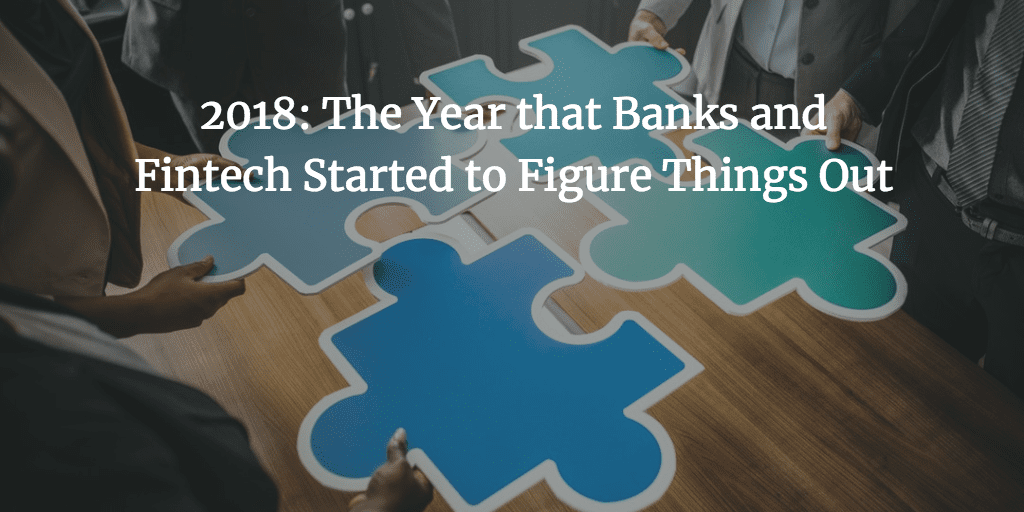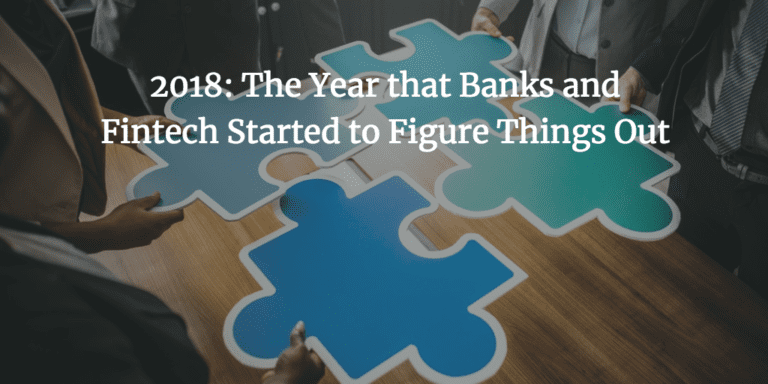
[Editor’s note: Please meet our newest contributor to Lend Academy. Mike McEnaney joined the LendIt content team late last year and this is his first feature article on Lend Academy.]
We were one year too late. At Lend Academy we predicted that 2017 would be the year of the bank/fintech partnership but it wasn’t until this year that we really started to see serious momentum. 2018 was a big year for bank/fintech partnerships and despite the fact some naysayers have claimed these partnerships are “doomed to fail”, the list of winners appeared to be much longer than the list of losers.
There was a powerful synergy being built between banks and fintech companies in 2018 that has the potential to lift the entire financial sector. While it may be true that banks can’t partner themselves into digital relevancy, their survival may well rest on these fintech collaborations and making sure they are structured with a win-win vision.
Banks win by gaining the ability to provide a far better customer experience, reducing their costs, increasing loan originations in various asset classes, providing more loans with no additional staff and ultimately increasing revenue. The win for fintech comes in the form of access to the loyal customer base banks possess, tapping into the deep financial services experience of banks and gaining greater familiarity with the regulatory environment.
As we begin 2019, the fintech/bank partnership landscape is also beginning to show some ROI as these collaborations are indeed increasing both top-lines and bottom-lines. Even financial institutions that once scoffed at the notion of these partnerships are now getting on board, and research shows that fintech will be an increasingly important part of their long-term strategic plans.
While the focus from bank execs may have initially been on navigating the fintech disruption, the focus now is far more centered on the positive impact a fintech partnership can have. A core need for banks today in this new era of finance is to engage their increasingly digitally focused customer base in new ways.
The road ahead for fintech/bank partnerships will be all about the melding of fintech’s agility and their ability to solve customer problems in innovative ways with the trust and reliability banks have built over their long and successful history.
There were dozens of bank/fintech partnerships formed in 2018, here is a list of just some of the more interesting ones from the US and UK:
HSBC & Avant
HSBC Holdings teamed up with Avant Inc., a closely held online lender, to offer unsecured loans to new and existing customers in the US.
PNC & OnDeck
PNC Financial Services Group’s PNC Bank will use technology from digital lender OnDeck Capital to extend loans to small businesses online.
Tandem Bank & Stripe
UK digital bank Tandem partnered with Stripe to power their new “Auto Savings” feature (created as a way to lower the barriers for Tandem app users who want to save for a rainy day.
JPMorgan & Plaid
JPMorgan partnered with Plaid in an effort to give its customers better control over their personal data.
Citigroup & Thinknum
Citigroup partnership with data startup Thinknum provides clients with alternative data sets; the data includes social media traffic, job postings, price and availability of products and more.
BMO Harris & AutoGravity
BMO Harris Bank is making car buying more simple and transparent for consumers by partnering with the auto-focused fintech AutoGravity. AutoGravity partners with banks to give car buyers direct control over how they finance or lease their cars while connecting them to a nationwide network of trusted car dealerships.
American Express & GreenSky
The two companies partnered to bring innovative point-of-sale lending technology to more merchants, enabling them to offer frictionless payment options to customers.
HSBC UK & Consents.online
HSBC UK is set to capitalize on the opportunities presented by Open Banking after agreeing to a partnership with consents.online, an Account Information Service Provider (AISP).
Starling Bank & UK Post Office
While this is not a bank/fintech partnership it was notable nonetheless because it was the first such deal in the UK with a digital bank. The Starling Bank partnership with the Post Office partnership will allow Starling consumer and business account customers to deposit and withdraw cash through the Post Office’s 11,500 branches nationwide.
Radius Bank & Mantl
The two companies combined to launch a new digital account opening platform, that allows consumers to enjoy a frictionless account opening experience, reducing the time it takes to open an account to less than 4 minutes from any device
Goldman Sachs & Cadre
The two companies formed a strategic partnership to allow Goldman’s clients to invest in a broad-based portfolio of U.S. income producing commercial real estate assets.
BankMobile & Upstart
Bank Mobile “Powered by Upstart” is a SaaS lending platform that provides a complete solution — including borrower acquisition, underwriting, verification, and servicing — and requires zero upfront capital investment in technology.
KeyBank & Bolstr
This partnership enables KeyBank’s small business clients to streamline the process of applying for credit. And in turn, the Bolstr platform (a digital lending and SaaS platform) will enable KeyBank to digitally accept and process loan applications significantly faster and at a lower cost.
TD Bank with Flybits, Kasisto and Moven
TD Bank has seen their mobile app become number one in Canada for the finance category on iOS and Android; the bank has utilized fintech partnerships with Flybits, Kasisto and Moven to a build a new age banking experience
Blue Ridge Bank/Pioneer Bank & SoFi
The two community banks made the decision in 2018 to buy SoFi loans using Promontory Interfinancial Network’s service.
Fifth Third Bank & Commonbond
The pair partnered to help provide solutions to those customers with student debt, consolidating multiple private and federal loans into one easy payment.
Barclays and MarketInvoice
This was probably the most significant partnership announced in the UK last year. This multifaceted partnerships was formed to improve the way small and medium sized businesses in the UK manage cash flow and accelerate growth.
While 2017 may have fanned the bank/fintech partnership flames, the fire truly got going in 2018, particularly in the latter half of the year. Every bank in the country is now looking at how they are engaging digitally with their customers and what they can learn from fintech platforms. The momentum is not going to stop any time soon – leaving us all very much looking forward to what’s in store for 2019.


